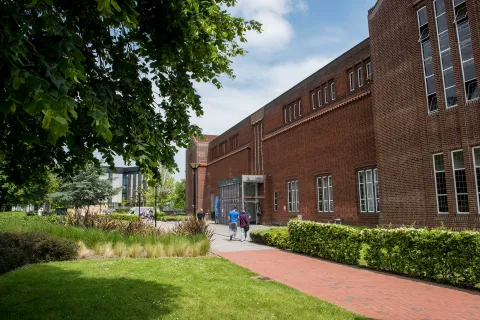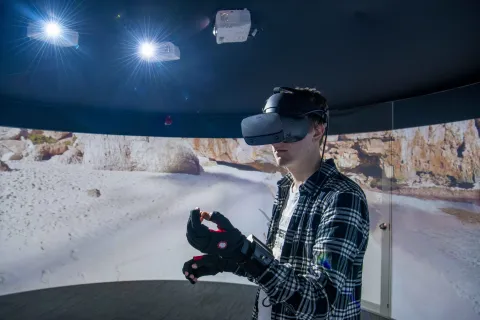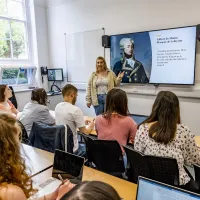Facilities

Main library


Build your critical thinking, cultural understanding and communication skills by studying English and French, German or Spanish.
Spend a year of this 4 year English literature and modern languages degree abroad on a workplace, teaching or university placement. You can choose a language you have not studied. You'll get extra hours of teaching and funding for a language course abroad at the end of year 1 to make fast progress.
Whichever language you choose, you'll:
Choose topics and gain expertise in areas that interest you most, including:
These are the languages you can choose from:
English at Southampton is a top 10 English department in the UK (Times Good University Guide, 2025).
We're also ranked:
We regularly review our courses to ensure and improve quality. This course may be revised as a result of this. Any revision will be balanced against the requirement that the student should receive the educational service expected. Find out why, when, and how we might make changes.
Our courses are regulated in England by the Office for Students (OfS).

In my first, second and third years, I volunteered for the Southampton Hub Schools Plus scheme. I enjoyed working with pupils and giving something back to the local community. It was very rewarding to see the students grow in confidence every week.


This course is based at Avenue.
This qualification is awarded by the University of Southampton.
The Course Description Document details your course overview, your course structure and how your course is taught and assessed.
AAB including an essay writing subject
Offers typically exclude General Studies and Critical Thinking. Essay writing subjects include: History, English Language and Literature, English Language, English Literature, Drama and Theatre Studies, Modern Languages, Philosophy, Religious Studies, Classical Civilisation, Politics, Geography, Sociology, Latin or any other humanities-based essay writing subjects.
If you are taking an EPQ in addition to 3 A levels, you will receive the following offer in addition to the standard A level offer: ABB including an essay writing subject and grade A in the EPQ.
We are committed to ensuring that all applicants with the potential to succeed, regardless of their background, are encouraged to apply to study with us. The additional information gained through contextual data allows us to recognise an applicant's potential to succeed in the context of their background and experience. Applicants who are highlighted in this way will be made an offer which is lower than the typical offer for that programme.
Pass, with 34 points overall with 17 points at Higher Level, including 5 at Higher Level in an essay writing subject*
Essay writing subjects include: History, English Language and Literature, English Language, English Literature, Drama and Theatre Studies, Modern Languages, Philosophy, Religious Studies, Classical Civilisation, Politics, Geography, Sociology, Latin or any other humanities-based essay writing subjects.
We are committed to ensuring that all learners with the potential to succeed, regardless of their background, are encouraged to apply to study with us. The additional information gained through contextual data allows us to recognise a learner’s potential to succeed in the context of their background and experience. Applicants who are highlighted in this way will be made an offer which is lower than the typical offer for that programme.
Offers will be made on the individual Diploma Course subject(s) and the career-related study qualification. The CP core will not form part of the offer. Where there is a subject pre-requisite(s), applicants will be required to study the subject(s) at Higher Level in the Diploma course subject and/or take a specified unit in the career-related study qualification. Applicants may also be asked to achieve a specific grade in those elements. Please see the University of Southampton International Baccalaureate Career-Related Programme (IBCP) Statement for further information. Applicants are advised to contact their Faculty Admissions Office for more information.
Distinction, Distinction in the BTEC National Extended Diploma plus A in an A level essay writing subject or Distinction, Distinction in the BTEC National Diploma plus A in an A level essay writing subject or Distinction in the BTEC National Extended Certificate plus A in an A level essay writing subject and A in one further A level
We are committed to ensuring that all learners with the potential to succeed, regardless of their background, are encouraged to apply to study with us. The additional information gained through contextual data allows us to recognise a learner’s potential to succeed in the context of their background and experience. Applicants who are highlighted in this way will be made an offer which is lower than the typical offer for that programme.
Offers typically exclude General Studies and Critical Thinking. Essay writing subjects include: History, English Language and Literature, English Language, English Literature, Drama and Theatre Studies, Modern Languages, Philosophy, Religious Studies, Classical Civilisation, Politics, Geography, Sociology, Latin or any other humanities-based essay writing subjects.
Distinction, Distinction in the BTEC Extended Diploma plus A in an A level essay writing subject or Distinction, Distinction in the BTEC Diploma plus A in an A level essay writing subject or Distinction in the BTEC Subsidiary Diploma plus A in an A level essay writing subject and A in one further A level
We are committed to ensuring that all learners with the potential to succeed, regardless of their background, are encouraged to apply to study with us. The additional information gained through contextual data allows us to recognise a learner’s potential to succeed in the context of their background and experience. Applicants who are highlighted in this way will be made an offer which is lower than the typical offer for that programme.
60 credits with a minimum of 45 credits at Level 3, of which 39 must be at Distinction and 6 credits at Merit, to include 6 Distinctions in an essay writing subject.
Essay writing subjects include: History, English Language and Literature, English Language, English Literature, Drama and Theatre Studies, Modern Languages, Philosophy, Religious Studies, Classical Civilisation, Politics, Geography, Sociology, Latin or any other humanities-based essay writing subjects.
H1 H2 H2 H2 H2 H2 -including as essay writing subject
Essay writing subjects include: History, English Language and Literature, English Language, English Literature, Drama and Theatre Studies, Modern Languages, Philosophy, Religious Studies, Classical Civilisation, Politics, Geography, Sociology, Latin or any other humanities-based essay writing subjects.
Offers will be based on exams being taken at the end of S6. Subjects taken and qualifications achieved in S5 will be reviewed. Careful consideration will be given to an individual’s academic achievement, taking in to account the context and circumstances of their pre-university education.
Please see the University of Southampton’s Curriculum for Excellence Scotland Statement (PDF) for further information. Applicants are advised to contact their Faculty Admissions Office for more information.
D3 D3 M2 in three principal subjects including an essay based subject.
Offers typically exclude General Studies and Critical Thinking. Essay writing subjects include: History, English Language and Literature, English Language, English Literature, Drama and Theatre Studies, Modern Languages, Philosophy, Religious Studies, Classical Civilisation, Politics, Geography, Sociology, Latin or any other humanities-based essay writing subjects.
AAB from 3 A levels including an essay writing subject or AA from two A levels including an essay writing subject and B from the Advanced Welsh Baccalaureate Skills Challenge Certificate
Offers typically exclude General Studies and Critical Thinking. Essay writing subjects include: History, English Language and Literature, English Language, English Literature, Drama and Theatre Studies, Modern Languages, Philosophy, Religious Studies, Classical Civilisation, Politics, Geography, Sociology, Latin or any other humanities-based essay writing subjects.
We are committed to ensuring that all learners with the potential to succeed, regardless of their background, are encouraged to apply to study with us. The additional information gained through contextual data allows us to recognise a learner’s potential to succeed in the context of their background and experience. Applicants who are highlighted in this way will be made an offer which is lower than the typical offer for that programme.
Not accepted for this course.
Applicants must hold GCSE English language (or GCSE English) (minimum grade 4/C) and mathematics (minimum grade 4/C)
Find the equivalent international qualifications for our entry requirements.
If English isn't your first language, you'll need to complete an International English Language Testing System (IELTS) to demonstrate your competence in English. You'll need all of the following scores as a minimum:
We accept other English language tests. Find out which English language tests we accept.
If you don’t meet the English language requirements, you can achieve the level you need by completing a pre-sessional English programme before you start your course.
You might meet our criteria in other ways if you do not have the qualifications we need. Find out more about:
Find out more about our Admissions Policy.
ABB
Offers typically exclude General Studies and Critical Thinking.
If you are taking an EPQ in addition to 3 A levels, you will receive the following offer in addition to the standard A level offer: BBB and grade A in the EPQ.
We are committed to ensuring that all applicants with the potential to succeed, regardless of their background, are encouraged to apply to study with us. The additional information gained through contextual data allows us to recognise an applicant's potential to succeed in the context of their background and experience. Applicants who are highlighted in this way will be made an offer which is lower than the typical offer for that programme.
Pass, with 32 points overall with 16 points at Higher Level
We are committed to ensuring that all learners with the potential to succeed, regardless of their background, are encouraged to apply to study with us. The additional information gained through contextual data allows us to recognise a learner’s potential to succeed in the context of their background and experience. Applicants who are highlighted in this way will be made an offer which is lower than the typical offer for that programme.
Offers will be made on the individual Diploma Course subject(s) and the career-related study qualification. The CP core will not form part of the offer. Where there is a subject pre-requisite(s), applicants will be required to study the subject(s) at Higher Level in the Diploma course subject and/or take a specified unit in the career-related study qualification. Applicants may also be asked to achieve a specific grade in those elements. Please see the University of Southampton International Baccalaureate Career-Related Programme (IBCP) Statement for further information. Applicants are advised to contact their Faculty Admissions Office for more information.
Distinction, Distinction in the BTEC National Extended Diploma plus B in an A level, or Distinction, Distinction in the BTEC National Diploma plus B in an A level, or Distinction in the BTEC National Extended Certificate plus AB from 2 A levels.
We are committed to ensuring that all learners with the potential to succeed, regardless of their background, are encouraged to apply to study with us. The additional information gained through contextual data allows us to recognise a learner’s potential to succeed in the context of their background and experience. Applicants who are highlighted in this way will be made an offer which is lower than the typical offer for that programme.
Offers typically exclude General Studies and Critical Thinking.
Distinction, Distinction in the BTEC Extended Diploma plus B in an A level, or Distinction, Distinction in the BTEC Diploma plus B in an A level, or Distinction in the BTEC Subsidiary Diploma plus AB from 2 A levels.
We are committed to ensuring that all learners with the potential to succeed, regardless of their background, are encouraged to apply to study with us. The additional information gained through contextual data allows us to recognise a learner’s potential to succeed in the context of their background and experience. Applicants who are highlighted in this way will be made an offer which is lower than the typical offer for that programme.
60 credits with a minimum of 45 credits at Level 3, of which 30 must be at Distinction and 15 credits at Merit.
H1 H2 H2 H2 H3 H3
Offers will be based on exams being taken at the end of S6. Subjects taken and qualifications achieved in S5 will be reviewed. Careful consideration will be given to an individual’s academic achievement, taking in to account the context and circumstances of their pre-university education.
Please see the University of Southampton’s Curriculum for Excellence Scotland Statement (PDF) for further information. Applicants are advised to contact their Faculty Admissions Office for more information.
D3 M2 M2 in three principal subjects
Offers typically exclude General Studies and Critical Thinking.
ABB from 3 A levels or AB from two A levels and B from the Advanced Skills Baccalaureate Wales.
Offers typically exclude General Studies and Critical Thinking.
We are committed to ensuring that all learners with the potential to succeed, regardless of their background, are encouraged to apply to study with us. The additional information gained through contextual data allows us to recognise a learner’s potential to succeed in the context of their background and experience. Applicants who are highlighted in this way will be made an offer which is lower than the typical offer for that programme.
Not accepted for this course.
Applicants must hold GCSE English language (or GCSE English) (minimum grade 4/C) and mathematics (minimum grade 4/C)
Find the equivalent international qualifications for our entry requirements.
If English isn't your first language, you'll need to complete an International English Language Testing System (IELTS) to demonstrate your competence in English. You'll need all of the following scores as a minimum:
We accept other English language tests. Find out which English language tests we accept.
If you don’t meet the English language requirements, you can achieve the level you need by completing a pre-sessional English programme before you start your course.
You might meet our criteria in other ways if you do not have the qualifications we need. Find out more about:
Find out more about our Admissions Policy.
Please contact our enquiries team if you're not sure that you have the right experience or qualifications to get onto this course.
Email: enquiries@southampton.ac.uk
Tel: +44(0)23 8059 5000
This course offers an exciting and assorted range of topics.
In English, you’ll consider what texts do in the world while studying an array of writing, from the medieval period to now. You’ll also be able to choose from a selection of creative writing modules.
Enhance your language and linguistic skills by studying French, German, or Spanish. Your understanding of the politics and culture of these languages’ societies will grow.
You’ll spend a year abroad on a work placement, a British Council placement, or at a partner university.
You’ll think about how cross-cultural exchanges have shaped English literature throughout history. Learn how to read, understand, and write about poetry more effectively.
You’ll also develop your French, German, or Spanish skills and get a broad introduction to the culture and history of your chosen language. From this, you’ll gain the academic abilities a student of modern languages and linguistics needs.
In semester 2, you’ll choose from exciting options across literature, language, linguistics, culture, and society.
At the end of year 1, you can take a summer course abroad in your chosen language if you did not study it before the degree.
In year 2, you’ll engage with global literatures in English from the 19th to 21st centuries and enhance your skills in your chosen language.
You’ll also plan research using a foreign language and prepare for the cultural differences you’ll experience in your year abroad.
There are many English modules to choose from, like Arthurian Literature, Early Modern Play, and modern African writing. You can even choose creative writing options.
In your modern languages options, you’ll learn about the cultures and societies of your chosen language. You’ll study cultural aspects like ethnography, European identity, and linguistics. You’ll also explore language studies and teaching English.
You’ll spend a year abroad on a work placement, a British Council placement, or at a partner university. During this time, you’ll complete an assessed portfolio of work in English and your chosen language.
You’ll work on your own and get to know a foreign culture first-hand.
We’ll support you with frequent video call sessions and email contact.
We’ll support you as you return to your degree programme in your final year.
You’ll be able to tailor your degree to your interests and refine your skills in your chosen language.
Choose from various optional modules in languages and linguistics, such as:
English modules include subjects as diverse as medieval monsters, Shakespeare, and Holocaust writing.
You can also take creative writing options, including teaching creative writing in schools. These options involve a voluntary work placement. Alternatively, you can choose a dissertation in English or your chosen modern language.
Want more detail? See all the modules in the course.
The modules outlined provide examples of what you can expect to learn on this degree course based on recent academic teaching. As a research-led University, we undertake a continuous review of our course to ensure quality enhancement and to manage our resources. The precise modules available to you in future years may vary depending on staff availability and research interests, new topics of study, timetabling and student demand. Find out why, when and how we might make changes.
Choose from the study paths below to display modules on this page.
Modules will display here
You must study the following modules in year 1:
This module is designed to ease the transition from A-level to the first year of a single or combined honours degree programme by setting out clearly what we expect of you at undergraduate level and equipping you with the resources to be able to operate a...
English has always been on the move. As a literary language, it has not only travelled from and back to England; lines of influence between texts, authors, publishers, editors, book technologies, and readers traverse the globe in multiple directions, bet...
This module is designed to provide you with a broad introduction to the culture, history and language of France and Francophone countries. By studying various types of primary and secondary sources, you will become familiar with a wide range of themes, e...
This module is designed to provide you with a broad introduction to the culture, history and language of Germany and other German-speaking countries. By studying various types of primary and secondary sources, you will become familiar with a wide range o...
This module is designed to provide you with a broad introduction to the culture, history and language of Spain, Latin America and the Spanish speaking World. By studying various types of primary and secondary sources, you will become familiar with a wide...
How do we read poems, and what language can we use to describe our readings? This module will provide a detailed introduction to the particular qualities your ear, eye and brain will need to read poetry more effectively. You will study key features of poe...
You must also choose from the following modules in year 1:
This unit will introduce you to the main areas relevant to applied language studies.
This module provides an introduction to linguistic approaches to sound, structure and meaning in the branches of linguistics known as phonetics and phonology, morphology, syntax, semantics and pragmatics.
Why have some stories gripped the imagination of writers, musicians, and artists across cultures and centuries? And what does the emergence and constant re-emergence of such stories tell us about ourselves and others, past and present? What do readers and...
Where did the idea of ‘English Literature’ as we know it today come from? When and how did writers first start thinking of themselves as English authors? How did the mechanisms of book production and the material forms of books shape readers’ understandin...
The module asks big questions. What do we do when we interpret literature and culture, and how can we analyse our practices of interpretation? Can anything be a text, and if so what do we understand by ‘literature’? How does literature shape our identity,...
This introductory course will give you an overview of some approaches to, and topics within, cultural and literary studies. You will spend time on close textual reading, as well as on broader cultural analysis. It aims to encourage you to experiment in c...
This module will introduce you to studying questions of history, society and culture through the prism of Southampton in order that you can apply those approaches to the study of cities in the French, Spanish and German-speaking world.
In this module, you will learn how to approach dramatic texts in a way that takes into consideration their place in the world as a complex political, economic, and cultural network. We will focus on questions such as: • What is the difference between r...
You must study the following modules in year 2:
The module will prepare participants for a period of residence abroad, and clarify the links between the Residence Abroad Portfolio (RAP) and specific teaching and learning experiences taking place in years two and four.
Since 1800, new modes of transport and communication, commerce and violence, have remade the world. As empires expanded and contracted, and as the relationships between states and individuals were repeatedly reconfigured and tested, ways of conceptualisin...
You must also choose from the following modules in year 2:
This course is designed to expand and deepen your knowledge of the cultures of the Portuguese-speaking world, bringing together written texts, visual and conceptual art, political materials, and cinema from twentieth-century Portugal, Brazil, and Portugu...
The course examines major turning points in Spanish and Portuguese America from the middle nineteenth century to the present, with a focus on how these upheavals affected and reflected the politics of class, gender and race.
In Africa, the ideal of freedom has the capacity to evoke multiple layers of struggle and aspiration: from state decolonisation and the end of official racial segregation, to gendered, national, economic and spiritual freedoms. Historically, the novel has...
Many writers begin with the short story. Through writing short stories they are able to experiment, learn the fundamentals of narrative composition, and have the satisfaction of completing something to a high standard in a relatively short period of time....
In this module, we introduce corpus linguistics as an approach to and method for analysing large-scale text data. We will develop an understanding of building and curating datasets, annotating data, and using quantitative and statistical measures for lang...
Data is material. It is produced by people, it is made possible by resource extraction, it needs power to survive, it inhabits and resculpts the landscape. The use of data, then, contributes to climate catastrophe, but that role can be hard to see, hidden...
Data organise our present and shape our future. Those data are never neutral because they are the product of human labour, of choices made by people about what data to record, how to record it, and who is best equipped to do that recording. Drawing on wor...
Literary history is often told in epochs. In particular, it can be useful to understand the world in relation to some or other idea of “modernity”: for example, English literary studies is often organised through conceptions of the early modern, the mode...
This module highlights and analyses the link between language structure and its situation of occurrence.
This module uses ethnographic approaches to understand the diversity of Latin America’s peoples and cultures. Emphasizing the emergence within Latin American anthropology of focuses on everyday life through topics such as kinship and family, ritual and re...
What does it mean to make literature new? What forms and reformations have offered starting points for rethinking literary convention? In this module, you will explore the revolutions, innovations, and boundary-crossings that have taken place in literatur...
This module explores various aspects of the French language from the perspective of modern linguistics: phonetics, phonology, morphology, syntax and lexis
The module introduces you to relevant issues and topics of contemporary Spanish linguistics and establishes the basis for future application of linguistic principles.
This module will introduce you to some of the principal realist and documentary movements, asking how the simple aim to ‘show things as they really are’ has resulted in a range of creative and wildly different cinematic forms. It will consider the issue a...
How do filmakers grapple with the difficulties of remembering events that many would rather forget? How are we haunted by the past? How do they seek to represent events that seem to defy representation? In tackling these questions, this module provides yo...
This module will problematize the concept of globalisation and explore and develop an understanding of its meaning in economic, political and cultural terms. Furthermore, we will examine the ideological struggle between competing forces over the nature an...
Many writers have penned essays about fiction and memoir: E.M. Forster, Virginia Woolf, Henry James, Edith Wharton, Italo Calvino, Vladimir Nabokov, Milan Kundera, A.L. Kennedy, A.S. Byatt, to name just a famous few. Indeed, it seems essential at some p...
How are the arts getting back to work again after Covid-19? This is a critically important question for everyone who cares about them, artists and audiences alike. If you’re a student considering a career in the arts you’ll want to know where fresh opport...
What developments led to the headscarf and the so-called ‘burka ban’ in France? Why has ‘multiculturalism’ been a taboo subject? To what extent have anti-racism associations been a success in combating racism? This module offers you the opportunity to gai...
The module aims to develop your critical awareness of Latin American music and dance cultures of the twentieth and twenty-first centuries, and the ways that scholars have approached them. Rather than a survey of Latin American music, the course will be th...
The main aim of this course is to explore and assess the contemporary importance of the German language, both within the so-called German-speaking countries and in the wider world. We shall identify key sociolinguistic issues as they relate to German-spea...
This module will introduce you to the making of institutions through language. We will investigate the links between language, institutions, and power to understand, how institutions are not only shaping the language used by members and users of instituti...
This module will introduce you to the notion of ‘Multilingualism’, how this is understood and represented in different ways, and why it matters to you. You will explore how people become multilingual, and whether it makes a difference if multilinguals are...
This module is designed to explore in detail the key areas of feminism, postcolonial theory, and cultural semiotics i.e. the analysis of cultural signs, whether in visual culture, such as advertising, political culture, or based in cultural practices. Th...
This module examines different sub-topics in psycholinguistics which help to understand what the relationship between language and the human mind might be.
Early modern England is a period associated with Elizabeth I and the Tudor court, the plays of Shakespeare, blood and violence on the Jacobean stage, the discovery of new worlds, and the persecution of witches and heretics. The diversity and vitality of t...
In this module, we will investigate and reflect on the various entanglements between Queerness and digital technologies. Drawing from foundational concepts in Queer theory and gender studies scholarship, this module deconstructs and reconceptualises domin...
Revolutions would break, remake, and reform societies on both sides of the Atlantic from the disruptions of the English Civil War to the global conflicts of the Napoleonic Empire. Revolutions may be those sudden changes in political life that men have tra...
In 1831 the philosopher John Stuart Mill struggled to define the ‘Spirit’ of the nineteenth century. ‘It is’, he wrote, ‘an age of transition. Mankind have outgrown old institutions and old doctrines, and have not yet acquired new ones.’ If the nineteenth...
Dialogue, pace, setting, and story. Understanding the nuts of bolts of scriptwriting is not only key to a successful piece of theatre, cinema, or radio, but to all forms of creative writing or literary analysis. This course will introduce you to the art o...
How did people in early medieval England think, feel, and write about the world they inhabited? In what sorts of ways did literature and other forms of texts shape their engagements with landscapes, environments, and the beings – real and imagined – with ...
This module builds on the basic concepts of articulatory phonetics introduced in the first year, and introduces theory and methodology of acoustic science for the study of the production and perception of speech sounds.
How do writers activate and amplify the sonic properties of language? Why do artists use vocal performance of text in video art? How can text ‘perform’ on the page (or onscreen), and what does it mean for language to be performative? What does writing for...
What can the voices and narratives of sex workers and asylum seekers depicted in world literature and visual culture tell us about the conditions and pressures of life in the contemporary world? How might considerations of narrative technique, genre, and ...
This module will provide introduce you to the study of syntax within current linguistic theory.
This module will introduce you to key issues, concepts and methods in teaching English as a second/foreign language.
The course seeks to provide an overview of the evolution of the European Union (EU) from its early stages to the present. In so doing, it examines the ideas and history of the EU, the institutions of the EU, examples of specific issue areas and the presen...
In this module, students will explore a wealth of different texts and different discourses, from the literary to the scientific, on humanity and the human body in the early modern period. Starting with a glimpse of ancient and modern visions of the body, ...
Blood, violence, terror, raids, pirates, rape and pillage are just some of the words associated with the Vikings in both the medieval and modern imagination. Their fearsome reputation is underlined by nicknames such as ‘Blood Axe' and ‘Skull-splitter', bu...
This module takes an empirical approach to questions such as: - Are there patterns of speech and language associated with males and females in varieties of English? - What is the role of teenagers in the propagation of change in English? - After a...
This module will introduce you to the social, political and cultural history of Vienna and Berlin in the 20th century, German using a wide range of sources which will include literature, film and architecture. Topics covered may include the following:...
You must study the following module in year 3:
You must study the following module in year 4:
You must also choose from the following modules in year 4:
This module explores the rise of English as a global language focusing on the factors that have led to, and the issues that have arisen from, its dominant status. You will learn about the interrelation between globalisation, standardisation and variabilit...
What constitutes the experience of being American, or of America itself? America has been referred to as simultaneously a colony and a colonizer; the first democracy thus representing one of the first populist and anti-colonialist revolutions (1776), but...
As the Puritan colonialist John Winthrop said at Holyrood Church in Southampton before embarking for Boston, American was to be ‘as a city upon a hill’, a beacon of progress and enlightenment for the world. But from the beginning, America has been shadowe...
What can animals teach us about the human and non-human? What do the creative forms we use to describe them show us about human form and the other? In this module, you will read a range of poetic and critical material which explores the porous boundaries ...
This module will introduce you to the different types of audiovisual translation and the various kinds of subtitles produced nowadays. You will learn about the interaction between text and image and the technical issues and constraints involved in creatin...
This module will introduce the main theoretical ideas of language and identity alongside tracing the historical, social and linguistic background to the presence of the so-called Latinos in the USA. By considering a range of texts, as well as cultural ou...
Are you interested in helping young people study English? This module will introduce you to teaching creative writing in secondary schools by providing training in effective classroom management and guidance on designing lesson plans for studying fiction ...
Based on written texts, films and visual materials from and about Portugal, Brazil, Angola, Cape Verde, Guinea-Bissau and Mozambique, this course is intended to show you the cutting edge of cultural production and research from the Portuguese-speaking wo...
Undertaking independent research into an aspect of literature or creative writing which particularly interests you is a cornerstone of your degree. A dissertation gives you the opportunity to study a subject in much greater depth than usual and, with gui...
Fantasy film and fiction spans a wide range of texts, from Gothic 'classics' and feminist fairy tales, to Utopian literature and musicals. Analysing fantasy texts alongside psychoanalytic and cultural theories will enable you to engage with questions conc...
This option will examine the relationship between French identity and culture since 1981 with the elections of François Mitterrand by exploring the ways in which identities of different social groups are expressed within the economic, political and cultur...
This module in French sociolinguistics aims to build on and re-evaluate your existing knowledge of the French language from a sociolinguistic perspective. The module has three major themes: language change, language variation and language identity in rela...
The turbulent history of Austrian and German Jews during the twentieth century was accompanied by the production of a diverse and influential body of German-language literature by Jewish authors. Prior to World War Two, Jews played a crucial role in the c...
How has the Holocaust been represented? We will examine a range of responses to the Holocaust from the 1940s to the present day, including memoirs of camp survivors and experimental texts. Focusing on the limits of representation we will approach question...
This new module studies writing and visual representation in the early years of the republic of the United States. Focusing on the period from shortly before the American Revolution to the early years of the nineteenth century, this module will introduce ...
The 1790s was a decade of revolutions abroad and of chaos and state paranoia at home. Britain began its longest continuous war in 1792. In a letter years afterwards to Byron, Percy Shelley declared that the French Revolution was ‘the master theme of the e...
This module examines the theory and practice of language teaching and explores 'reflective practice' as a set of skills that can be applied to your future working life.
This module develops awareness of how language testing and assessment have developed in educational and wider social contexts. It focusses on both purposes and processes of language testing and assessment, and critically examines applications in policy ar...
One of the socially and culturally most significant consequences of transnational mobility is that urban populations in particular are increasingly multilingual: in global cities such as London, New York and Berlin there are speakers of hundreds of differ...
The stereotype of Africa as a predominantly ‘natural’ space ignores the existence of large and cosmopolitan urban environments on the continent. Yet today, the sprawling conurbations of Lagos, Nairobi and Johannesburg (as well as Africa’s other towns and ...
Germany has had a long tradition of immigration and is one of the most multi-cultural countries in Europe today. We will examine the impact of diverse immigration movements on recent German history and notions of German identity. This includes examining b...
This unit will allow students to undertake independent research to produce an in-depth study of a specific topic located in one of the fields within Modern Languages. You will also have the option of producing a professional project. In that case, your d...
Monsters lurk at the edges of the medieval map and imagination. These creatures repulse, fascinate, disconcert, and challenge humans in many of medieval Europe’s most intriguing and compelling texts from Beowulf to Sir Gawain and the Green Knight. This mo...
This module will provide students with both a practical and theoretical insight into the role of a Public Service Interpreter. Beginning with a general introduction to interpreting, it will go on to focus more in depth on the wide range of issues and chal...
The seventeenth century was a time of extreme change and political instability in England. In 1649, after years of civil war, Charles I, the King of England, was beheaded on Whitehall in front of a crowd of thousands. England, overnight, became a republic...
This module provides an insight into the cognitive processes involved in the acquisition of language. Different theories of first and second language acquisition will be examined and critically assessed in the light of empirical evidence. Various factors ...
This course will introduce you to a range of examples of Spanish American (e.g. may include Puerto Rican, Argentinean, and Mexican [American]) and Iberian cultural production from the period of the 1980s to the 21st century, in order to provide a sense o...
Has Shakespeare aged well? From the boys in wigs on the Elizabethan stage to the digital wizardry of the twenty-first century, the technology as well as the ideology that informs Shakespearean performance keeps evolving—sometimes in unexpected ways. This ...
This final year module builds on the theoretical grounding students gain in LING 2011 Variation and Change in English and the instrumental analysis techniques from LING 2008 Sound and Voice. Through a series of computer, lab-based sessions, students test ...
Are we living in an age of climate change or climate crisis? In her 2019 speech to the World Economic Forum, Greta Thunberg famously declared “Our house is on fire”: a statement underscored by the Australian bushfire crisis of 2020 and the mass devastatio...
Translation plays a major role in the exchange and circulation of practical information and culture production. This means that even if they do not enter the translation profession, in a society that is increasingly global, Modern Linguists are frequently...
The module examines selected written texts and films in the areas of travel, cultural encounter and identity. These will cover a variety of topics and cross-cultural encounters, within the broad area of Francophone film and non-fiction writing. Critical...
From Plato’s Republic and Thomas More’s Utopia to Margaret Atwood’s Handmaid’s Tale and Philip Roth’s The Plot Against America, utopias have always been haunted by the spectre of the dystopian. If utopias imagine alternative ways of organizing society, dy...
Once upon a time, no one called themselves queer; now it names everything from a kind of person to a type of weather. Queerness seems necessary, ubiquitous, paradoxical – but why? Ranging from the eighteenth century to the present day, this module will ex...
The module will take you through the process, the product and the place of writing. Process will deal primarily with modelling cognitive operations, analysis of composing strategies, and individual differences and changes in processes over time. Product w...
The essential elements of writing a novel include crafting beginnings and endings, constructing characters, manipulating structure and plot, and developing an intimate relationship with language. Writing exercises and discussions of work in progress will ...
The learning activities for this course include the following:
You’ll be supported by a personal academic tutor and have access to a senior tutor.
Alice Hunt is the course leader.
This degree will allow you to develop and evidence subject-specific and targeted employability skills. This includes the required skill set for a range of future careers, further study, or starting your own business.
The skills you can expect to focus on and gain from this course include:
The employability and enterprise skills you'll gain from this course are reflected in the Southampton skills model. When you join us you'll be able to use our skills model to track, plan, and benefit your career development and progress.
Download skills overview
Graduates commonly work in a range of organisations or sectors including:
Local, national and international governing bodies,
Publishing,
Teaching and Education,
Consulting,
Media and Broadcasting,
Journalism.

Choosing to do work experience is a great way to enhance your employability, build valuable networks, and evidence your potential. Learn about the different work and industry experience options at Southampton.
We are a top 20 UK university for employability (QS Graduate Employability Rankings 2022). Our Careers, Employability and Student Enterprise team will support you. This support includes:
We have a vibrant entrepreneurship culture and our dedicated start-up supporter, Futureworlds, is open to every student.
Your career ideas and graduate job opportunities may change while you're at university. So it is important to take time to regularly reflect on your goals, speak to people in industry and seek advice and up-to-date information from Careers, Employability and Student Enterprise professionals at the University.
Fees for a year's study:
Your tuition fees pay for the full cost of tuition and standard exams.
Find out how to:
Accommodation and living costs, such as travel and food, are not included in your tuition fees. There may also be extra costs for retake and professional exams.
Explore:
If you're a UK or EU student and your household income is under £25,000 a year, you may be able to get a University of Southampton bursary to help with your living costs. Find out about bursaries and other funding we offer at Southampton.
If you're a care leaver or estranged from your parents, you may be able to get a specific bursary.
Get in touch for advice about student money matters.
You may be able to get a scholarship or grant to help fund your studies.
We award scholarships and grants for travel, academic excellence, or to students from under-represented backgrounds.
The Student Hub offers support and advice on money to students. You may be able to access our Student Support fund and other sources of financial support during your course.
Find out about funding you could get as an international student.
We will assess your application on the strength of your:
We'll aim to process your application within 2 to 6 weeks, but this will depend on when it is submitted. Applications submitted in January, particularly near to the UCAS equal consideration deadline, might take substantially longer to be processed due to the high volume received at that time.
If we make you an offer which you accept, we’ll email you to confirm the language you want to study. We’ll be in touch no later than 2 months before the start of your course.
We treat and select everyone in line with our Equality and Diversity Statement.
Please contact our enquiries team if you're not sure that you have the right experience or qualifications to get onto this course.
Email: enquiries@southampton.ac.uk
Tel: +44(0)23 8059 5000
English and Modern Languages (BA) is a course in the English and Languages and linguistics subject areas. Here are some other courses within these subject areas:



